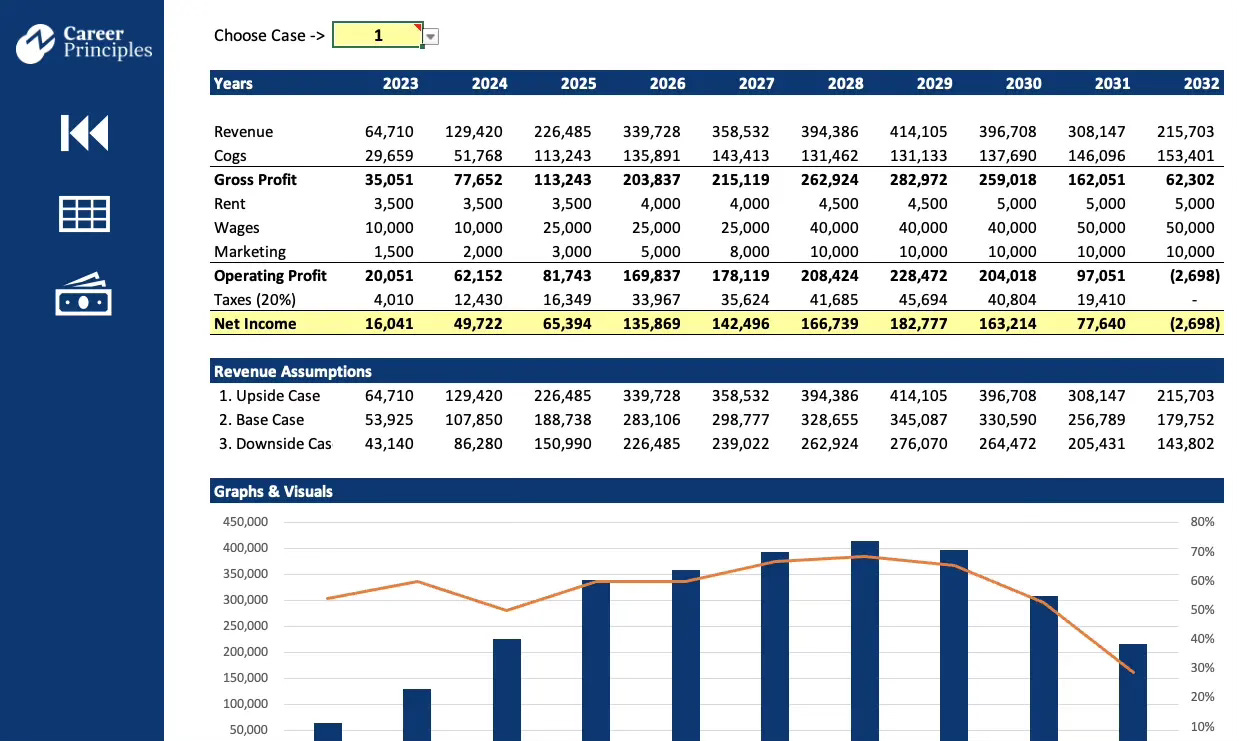Excel
Failing to prepare is preparing to fail.
Excel is a spreadsheet program developed by Microsoft, used for organizing, analyzing, and visualizing data. It allows users to create and manipulate spreadsheets, which consist of rows and columns, and perform calculations using formulas and functions.
If this kind of image terrifies you, I don’t want you to stop reading or look away now. This is a terrifyingly complicated financial spreadsheet and it’s what so many people think their’s has to look like when using it.
It does not - most of mine are very simple with just a few columns and formula and rarely any graphs or fanciness.
As the definition explained above, excel is designed for ORGANISING and that’s the main way that I use it. Sure, I also use the analysing and visualising functions from time to time, but it’s mostly a place where I can put all the information about my book business finances, timelines, goals, and other things, like lists of indie novel awards and their closing dates etc with hyperlinks.
It pays to be organised - quite literally! The number of times Excel has helped me to understand that what I’m planning to do might not be profitable (such as setting up an indie publishing house!) has saved my thousands and thousands of pounds.
Even for my own books alone, it’s good to see how small price changes from the likes of KDP and Ingram will impact on your royalties and while they both have their own on-site calculators for this, it’s good to have all the info handy, and in one place.
Manually recording sales numbers etc in a spreadsheet is also a good motivator and helps keep you more apprised of the numbers and progress than if you just use the dashboards provided by the distributors.
Some of the main advantages to using a spreadsheet like Excel:
Writing out the goals/finances/timeline means you’re WAY more likely to follow through or stick to them.
It means when you forget (and that happens a lot!) where you’re meant to be at a certain stage, or things have to change (ie your editor becomes ill or your cover artist can’t meet their deadline), it’s easier to just move things around on the sheet, rather than have to juggle all that stuff in your head.
It can do loads of automated calculations through the formulas tool which will save your head so much mathing and save you so much time as you can make small adjustments (say your editors price go up, or you sell more or less books than you anticipate etc) so easily and it will automatically recalculate your profit/loss for you.
It’s great for accountability and motivation and you can even use templates that track your word count and give you lovely displays on progress and how close you are to staying on track and meeting your goals.
Editors
I’ve already written a longer post on working with editors and how to find them here:
Editing stages and finding/working with editors
Based on feedback from last week’s email, it seems you would prefer I focussed on the aspects more unique to self-publishing and that experience, so I shall leave out the writing section that I had planned and will assume anyone interested in SP will have written a book already.
However, just to add a few things to that earlier post.
So many indie authors are tempted to dodge or cut back on the editing stage of the book production process - and I totally get why - it’s expensive, especially if you hire a GOOD, EXPERIENCED editor.
I mean, your niece who is studying English Lit might be alright for some things but they don’t have decades of experience of reading story, analysing structure, detecting plot holes, dissecting characters arcs and growth, keeping an eagle eye on your stories heart and also being able to articulate all of this stuff back to the author in a palatable and actionable way. It’s a skill and an art that takes a long time to get better at, and so it deserves to be well compensated.
Ultimately the less you invest in an editor, the more sales you will potentially lose out on. I have always subscribed to this thought - every pound you save in editing is 10 pounds lost in sales in the LONG RUN.
Sure the savings will help in the short term, but now I’m a couple of years in, I’m starting to see those long term investments paying off on my earlier books and I know if I’d invested less in them at the start, I’d have been better off then, but much worse off now.
It all comes down to one of my favourite sayings.
Hard choices, easy life.
Easy choices, hard life.
And this totally applies to getting your books well edited.
That’s all for this time, folks - hope that was helpful - I do always appreciate feedback!
May the Force be with you!







Good point regarding getting a quality editor. I've seen people get confused between copyeditor and an editor who can do all those things you mention. In fact many many years ago I would've been one of them but that's where learning craft and being part of writing communities really helps. Unfortunately I've read a couple of self published books where I can see that has happened.
Regarding Excel - I just got stressed reading that bit 😆 I get that it's really useful but I don't understand it & it would take a LOT of energy, time and high stress levels for me to learn how to use in the ways you mention. Wish I could because I see how useful it can be. I think my brain just doesn't work that way. So if I was to self publish or use for any business, I'm likely to spend money getting other people to set up the spreadsheets to use 😊